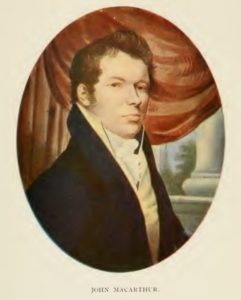I have been so busy writing stories for the Convict unit of my Diploma Course that I have not had any time to put up any blog posts recently. So here is a break out story from the main one I am writing on Mary Stevens. This story if part of my assessment. I will put the main story up at a later date.
Sydney N.S.Wales,
21st August 1801,
Gentlemen,
By the way of India I had the honor of writing you, a duplicate copy of which accompanies this. The Earl Cornwallis arrived here the 10th June. By that ship I received your letters and their several enclosures, together with the store, provisions, and passengers, the Commissary’s receipt for all which I enclose. The difference between the number of prisoners sent on board and landed here the mater accounts for by their having died of the dysentery during the voyage. Many of those landed are extremely weak and feeble. No complaint has been made of improper treatment during the voyage, and what is very extraordinary no complaint has been made by the agent or master of any very bad behaviour of any of the prisoners during the voyage. On the contrary they both speak to their advantage. I am sorry to observe that Lieut. Henry Crawford, of the New South Wales Corps, was drowned at Rio de Janeiro. The ship was cleared within the time allowed; therefore no demurrage has taken place.[1]
The death of Lieutenant Henry Crawford, overseer of the guard escort for the Convicts, illustrated the gradual increase in power in the Colony of Sydney, exercised by the Rum Corps and eventually leading to the Rum Rebellion.[2]
After the death of Lieutenant Crawford, another officer of the Earl Cornwallis, Lieutenant Marshall decided to swap a quilt and another item for his own, claiming that Lieutenant Crawford owed him money and thus the swap for better equipment made up the amount that Lieutenant Crawford had owed him.[3]
It appeared that Macarthur, at the time the senior officer, whilst both Governor King and the Lieutenant Colonel Paterson were absent, disagreed with Lieutenant Crawford’s intent. Thus he directed an inquiry before a bench of magistrates.[4] The result was that the Magistrates findings were mild with no ill intent attributed to Lieutenant Crawford. Regardless Governor King issued a reprimand. In addition to a reprimand Governor King also informed Lieutenant Marshall that he had obtained a passage for him aboard the Albion to take him back to England. [5]
Marshall, apparently did not take this direction well and obviously attributed the situation to Macarthur. So publicly and openly he insulted Macarthur. Equally Macarthur did not take that well and sent Captain Abbott to Marshall to challenge Marshall to a duel which Marshall accepted. Marshall chose Mr. Jeffries, Purser from the Earl Cornwallis as his second. Captain Abbott was Macarthur’s second. However, under the rules of the duel the seconds are supposed to be co-equals in rank. Captain Abbott refused to allow that Mr. Jeffries was his co-equal. Marshall and Jeffries both turned up to the appointed place and at the appointed time for the duel but Macarthur and Abbott did not. So the next time Marshall encountered Abbott he stuck him and claimed that he would do the same to Macarthur when he next saw him. [6]
As a result Marshal was prosecuted and bought before a criminal court. The Judges of the Court consisted of a number of people including five military officers. Not surprisingly Marshall claimed that the court was biased and objected to the five military officers trying the case. His objections were overruled and he was convicted of assaulting Abbott.[7]
As Governor King had considerable doubt about the entire case he eventually decided to remit the sentences passed onto Marshall for assault for fifty pounds and one years imprisonment, as long as Marshall left New South Wales. He also requested that the Court be re-convened due to fresh evidence. However, Governor King received a complaint from the five military officers of the trial, claiming that all members of the court had unanimously declared that it was impossible to reopen the case. Two members, the non-army, members of the court did not agree to the protest. This went on for some time. The upshot was that James Tennant, the commander of the Earl Cornwallis and one other officer, were requested to pay a fine if Marshal did not present himself, on entering Britain, to a court and pay his fifty pound fine and spend his year in gaol.[8]
[1] HRA Series 1.,Vol. 3. p.264
[2] Evatt, H. V. 1938. Rum Rebellion: A study of the Overthrow of Governor Bligh by John Macarthur of the New South Wales Corps. Angus and Robertson, Sydney, Australia.
[3] Trove. 1931 ‘DUELLING DAYS.’, The Sydney Morning Herald (NSW : 1842 – 1954), 13 June, p. 9. , viewed 01 Jun 2016, http://nla.gov.au/nla.news-article16785552
[4] Trove. 1931 ‘DUELLING DAYS.’, The Sydney Morning Herald (NSW : 1842 – 1954), 13 June, p. 9. , viewed 01 Jun 2016, http://nla.gov.au/nla.news-article16785552
[5] Trove. 1931 ‘DUELLING DAYS.’, The Sydney Morning Herald (NSW : 1842 – 1954), 13 June, p. 9. , viewed 01 Jun 2016, http://nla.gov.au/nla.news-article16785552
[6] Trove. 1931 ‘DUELLING DAYS.’, The Sydney Morning Herald (NSW : 1842 – 1954), 13 June, p. 9. , viewed 01 Jun 2016, http://nla.gov.au/nla.news-article16785552
[7] Evatt, H. V. 1938. Rum Rebellion: A study of the Overthrow of Governor Bligh by John Macarthur of the New South Wales Corps. Angus and Robertson, Sydney, Australia.
[8] Trove. 1931 ‘DUELLING DAYS.’, The Sydney Morning Herald (NSW : 1842 – 1954), 13 June, p. 9. , viewed 01 Jun 2016, http://nla.gov.au/nla.news-article16785552

